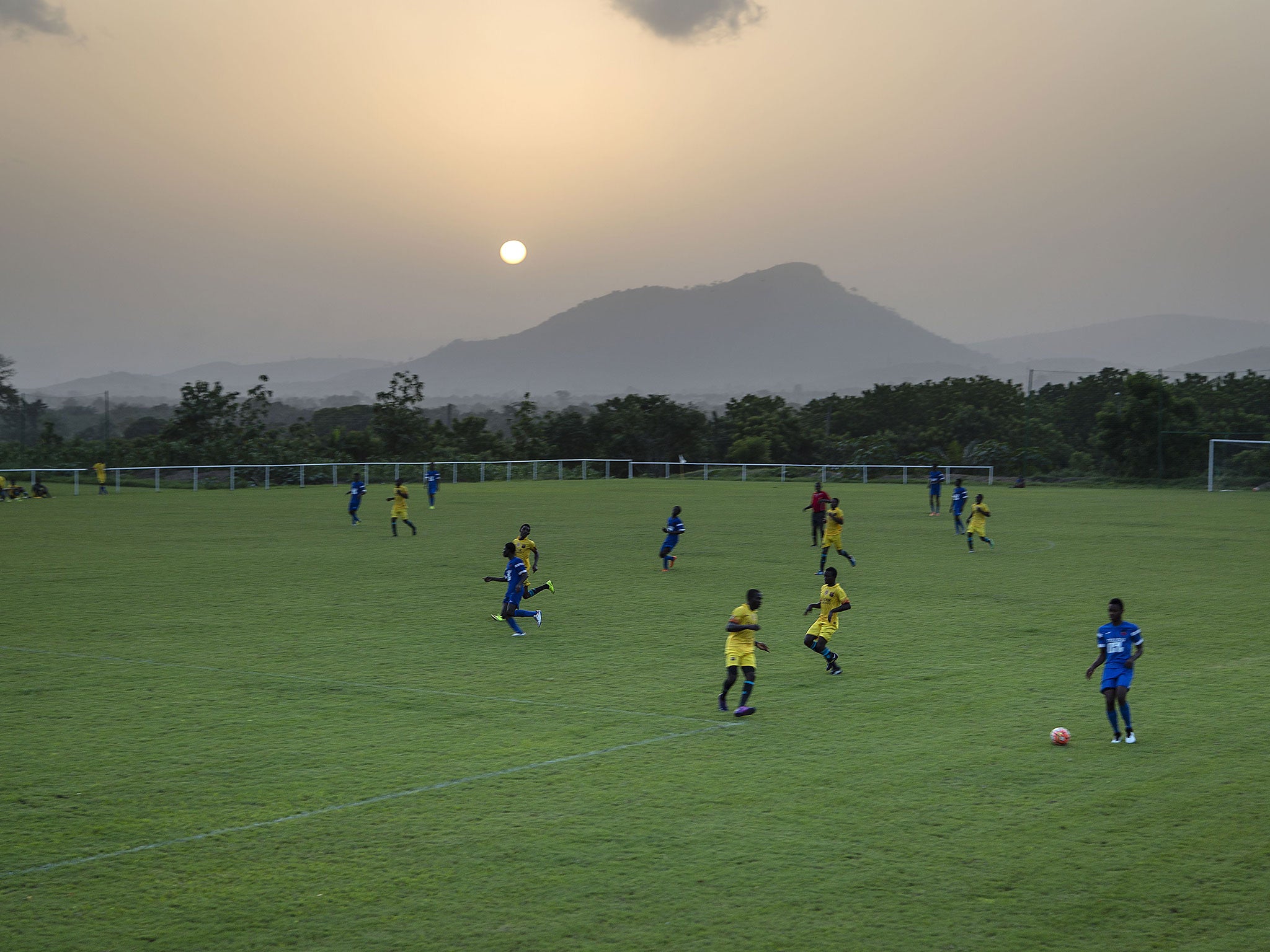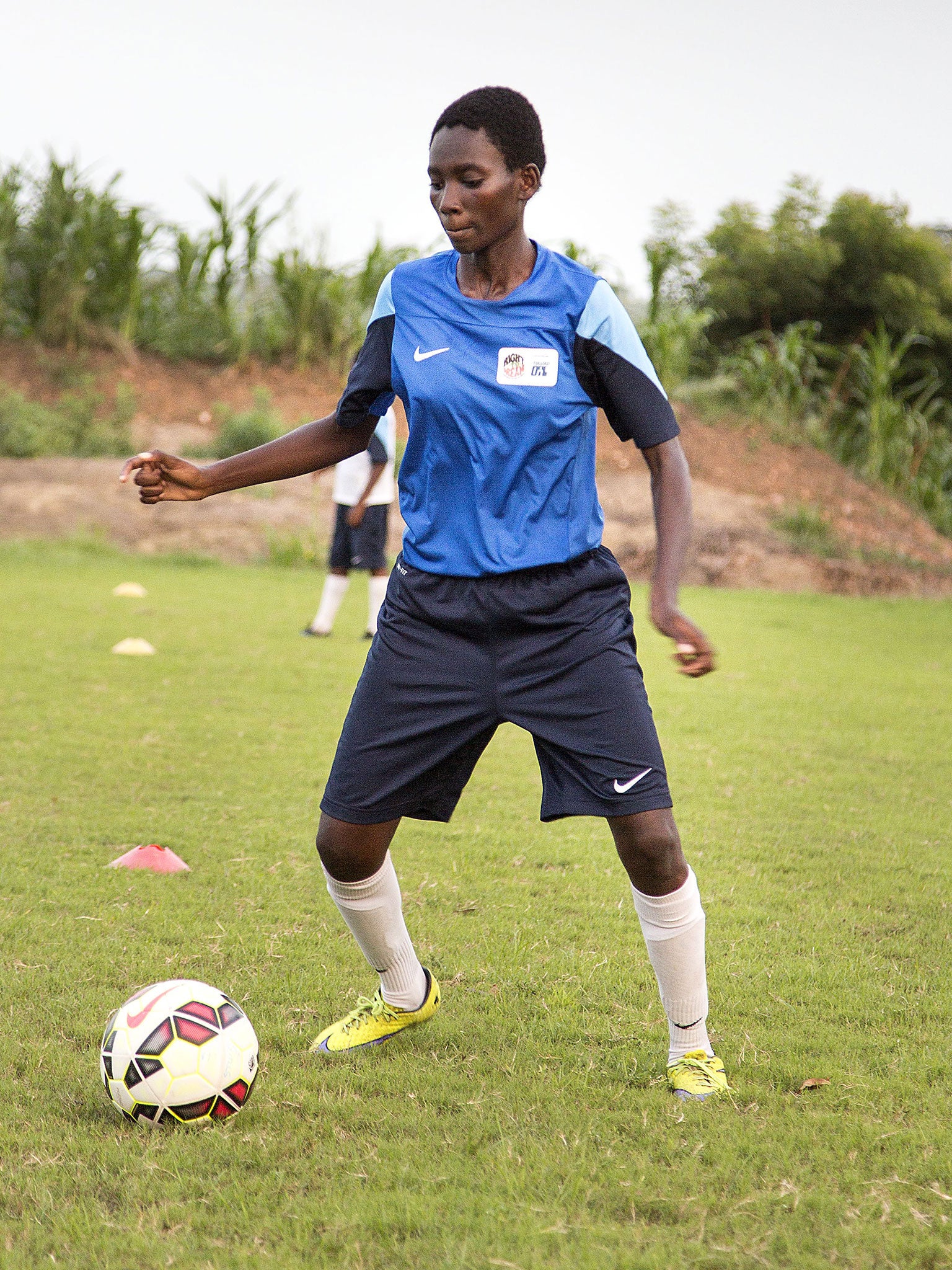Ghana’s girls make a play for the football big leagues
In a country where sport and education are traditionally dominated by men, the Right to Dream football academy is helping young women to excel at both

Your support helps us to tell the story
From reproductive rights to climate change to Big Tech, The Independent is on the ground when the story is developing. Whether it's investigating the financials of Elon Musk's pro-Trump PAC or producing our latest documentary, 'The A Word', which shines a light on the American women fighting for reproductive rights, we know how important it is to parse out the facts from the messaging.
At such a critical moment in US history, we need reporters on the ground. Your donation allows us to keep sending journalists to speak to both sides of the story.
The Independent is trusted by Americans across the entire political spectrum. And unlike many other quality news outlets, we choose not to lock Americans out of our reporting and analysis with paywalls. We believe quality journalism should be available to everyone, paid for by those who can afford it.
Your support makes all the difference.On the banks of the Volta River in Ghana’s Eastern Region, as the sun sets on a Friday evening, the Right to Dream football academy (RtD) is a hive of activity.
With lush green pitches and state-of-the-art equipment and facilities, the academy has produced a string of professional and international players over the years.
It was founded in 1999 by former Manchester United scout and social entrepreneur, Tom Vernon, on a dust pitch in Ghana’s capital, training a handful of boys, providing them with food and assistance with school fees. In 2005, they relocated to a residential model on the outskirts of Accra with grass pitches and education facilities and moved to the $2.5m purpose-built facility in 2010.
Now, RtD has opened the first residential football academy for girls in Africa, fighting against the dominance of male football and gender inequality present in Ghana. “The pitches are good quality here and it is a real opportunity for a player to develop,” says 14-year-old Louisa. “I didn’t get to play on these pitches when I was at home.”
She won a scholarship after competing with the more than 1,000 girls across Ghana and neighbouring Ivory Coast who took part in trials for the first nine places on the course.
“My cousin was the one who I started playing football with when I was about five and after church on Sundays we would go out and play all evening,” she says. “The first time I played on an AstroTurf pitch was during my trial and it was difficult for me because when I was growing up I always played barefoot, I didn’t wear boots and I had to start acting professionally.”

Major urban developments and a growing middle class have seen Ghana transform rapidly over the past decade, yet one-fifth of the population remains in poverty, and opportunities for girls are often constrained by traditional culture and conservative gender roles.
The academy’s programme, Mr Vernon says, “not only bodes well for challenging and changing the mindset around women in sport in West Africa but I would hope provides the catalyst for many more similar development opportunities for talented, African girls across the continent.”
Opened in May 2013, there are 15 girls at the academy with two more at RtD’s recently launched schools in the cities of Kumasi and Takoradi. Altogether RtD has over 90 students from seven African countries.
Long-standing gender divides persist in many parts of Ghana, with women mainly employed in informal economies, accounting for around 70 per cent of market traders in the country. In rural areas, almost three-quarters of women are farmers.
“I always wanted to fulfil my abilities in football but my mum and my dad – mostly my mum – were very education focused,” Louisa says. “She didn’t really like me playing football because in the society that I was brought up in girls didn’t really make it that far in football. In Ghanaian society it is not acceptable.”
She eventually came round to the idea, and “when she heard I had been selected she was very happy.”
Scepticism from parents was one of the biggest hurdles the academy faced when it first launched.
“We had to physically go to homes and explain the idea to them,” head of pastoral care Harry Adekpui says. “It took some time but they bought into it finally.”
Ten-year-old Emmanuella, whose mother is a market trader and father a mechanic, joined the academy last year. She says playing with boys was common back home – nine hours north in the town of Techiman.
“I went to training every afternoon at 3.30pm after school and I used to play with a boys team in Techiman and there were five girls playing there as well,” says the young midfielder, who dreams of playing for Manchester City.
The national league is still nascent and the Ghana Football Association has recently stated plans to further support the women’s game, although international side the “Black Queens” did claim a historic gold medal at the All Africa Games in September.
“When they come to an environment like this obviously a lot of things are so grand, things you would expect in a ‘rich man’s house’ and so coming here the first few weeks is quite tricky,” Adekpui adds. “But the culture we have built allows them to come in and feel part of the system.”
Football training at RtD is also complemented by excellent education, something which is limited for many in Ghana’s predominantly public school system. Less than 70 per cent of children enter secondary school, with girls less likely to finish than boys. Adekpui says: “Often students arrive and... their literacy and numeracy is almost none.”
More than 20 of the academy’s graduates have transferred to professional clubs while several have earned scholarships at schools and universities in the US and Europe.
The structures put in place by academies like RtD provide a safe and secure route to a possible football career, in a continent where youngsters desperate for a chance to play in Europe can often find themselves taking risks to make it. Last week, former Premier League footballer Al Bangura spoke about his experiences being trafficked into the United Kingdom after leaving his home of Sierra Leone, and warned of the rising numbers of teenage players being tricked into leaving Africa.
Abdul Majeed Waris, now playing for French side Lorient, became the first RtD graduate to play at a World Cup, representing Ghana in last year’s tournament. And with two US scholarships between them so far this year, RtD’s girls are catching up.
Join our commenting forum
Join thought-provoking conversations, follow other Independent readers and see their replies
0Comments